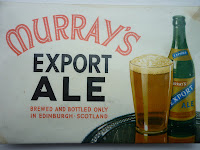.jpg) I mentioned a little while ago, that we (CAMRA Rochdale, Oldham and Bury) were visiting JW Lees Brewery as their guests, not to tour the brewery, but to hold a business meeting there. Naturally on the night, we asked William Lees Jones, the Managing Director, to say a few words. It went roughly like this:
I mentioned a little while ago, that we (CAMRA Rochdale, Oldham and Bury) were visiting JW Lees Brewery as their guests, not to tour the brewery, but to hold a business meeting there. Naturally on the night, we asked William Lees Jones, the Managing Director, to say a few words. It went roughly like this:
William first
of all re-iterated his own view that CAMRA was a positive force for good in the
industry and that he always told fellow brewers that a good relationship with
CAMRA is vital. In a wide ranging speech, highlights were that careful spending on the brewery itself, with
programme of re-building over the years, had meant that the brewery was in tip
top condition. As well as the ranges of cask beer being produced, the brewery
has a completely up to date and flexible lager plant producing Golden Original and Carlsberg. He mentioned that Golden Original sales were very impressive and that in a recent blind tasting (in which I was involved), it had come top against leading standard lagers. William mentioned that additionally Lees are sole importers of Draught Bohemia Regent Lager which is available throughout the estate and free trade. Lees even “export” Carlsberg Lager back to Carlsberg
itself. The estate will remain around 170 or so, give or take. Small pubs still give concern
and where a
living cannot be made for either tenant or the brewery, pubs will be
sold. Trading conditions remain difficult, but the brewery has been able to increase profits slightly by buying good quality pubs from the likes of Punch and bringing out their potential. Free trade has been badly affected by micro brewers being able to undercut Lees due to Progressive Beer Duty. William felt that micros cater for a segment of the market that mainstream brewers will never cover as well and that it provided choice for consumers, though PBD does give them a considerable competitive advantage.
For the future, there will also be more investment in brewery plant and pub décor as there is no intention to quit brewing or to become a Pub Company.
On the social side, we had a preview version of Plum Pudding, the Christmas beer and all the beers were, as you'd expect, on top form, particularly the Brewer's Dark, which I'd been looking forward to. I was rather impressed too with John Willies, a beer you don't come across all that often. I even managed to resist (just) a pint of Bohemia Regent.
And the home made meat and potato pie (from the Old Boar's Head I believe) with red cabbage was lovely too!
For the future, there will also be more investment in brewery plant and pub décor as there is no intention to quit brewing or to become a Pub Company.
- Three standard cask beers plus a seasonal was the aim for all managed houses
- Tenants encouraged to stock more from range
- More promotion of seasonal ales
- All seasonals 2013 will be single hop beers
- Possible collaboration on experimental beers with a local micro
- No room in Brewhouse for a pilot plant hence considering above
- Pubs will continue to be bought and sold with the estate remaining around 170
- £1 million is being spent on new German kegging plant (being installed currently)
- Vintage Harvest Ale selling massively in the US in various forms
- Manchester Star a big success in Sainsbury's Great British Beer Hunt

On the social side, we had a preview version of Plum Pudding, the Christmas beer and all the beers were, as you'd expect, on top form, particularly the Brewer's Dark, which I'd been looking forward to. I was rather impressed too with John Willies, a beer you don't come across all that often. I even managed to resist (just) a pint of Bohemia Regent.
And the home made meat and potato pie (from the Old Boar's Head I believe) with red cabbage was lovely too!
This article first appeared in the Winter Edition of our own More Beer Magazine. The photo is William Lees-Jones addressing members, with Head Brewer Michael Lees-Jones looking on.























































